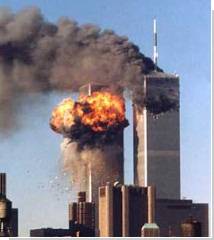|
 Like
many of us, Bill Lyman watched his television in horror
as United Flight 175 slammed into Two World Trade Centers.
But for Bill, the attack was personal. Those were his friends
and colleagues staring in despair out of their 104th-floor
windows at the flames licking upward, cutting them off from
escape. Like
many of us, Bill Lyman watched his television in horror
as United Flight 175 slammed into Two World Trade Centers.
But for Bill, the attack was personal. Those were his friends
and colleagues staring in despair out of their 104th-floor
windows at the flames licking upward, cutting them off from
escape.
Bill, a managing director of an investment-banking firm,
had overslept the morning of September 11. The cries of
his grandson had kept the 56-year-old awake into the early
hours. He was headed for work at 8:50 a.m. when his brother
called and told him to turn on the television, where he
learned of the first attack.
Bill immediately called the office, and two colleagues
advised him to stay home, as commuter trains were stalled.
"It's chaos here," one said. "Don't even
bother trying to come in today."
Less than an hour later, the two co-workers drowned in
an avalanche of steel and concrete.
"It was like special effects out of some horrible
movie," Bill sighs, months later, still choking back
tears at the raw memory. "I just watched all those
people die."
One-third of the firm's employees perished that morning,
some of whom Bill had known for 17 years. He had passed
hours on the road with others, discussing family and spinning
dreams. "I spent some extraordinary personal time with
these guys. It was like losing 8 or 10 brothers," Bill
explains.
I should have been there to pray with them, he remembers
thinking. I should have been there and I wasn't.
"It wasn't guilt,"
he says now. "It was just that I needed to be there
to help. I remember my son saying, 'Dad, there isn't one
of those people who would have wanted you there to die with
them. And you have to hang on to that. Take it easy Dad,
breathe.' He said I wasn't breathing. I don't doubt that.
I don't remember breathing for the whole day. "
"I really can't describe the grief,"
Bill continues. "To lose 66 people at once is numbing.
I went to 14 funerals in three weeks. That's probably more
than you go to in a lifetime."
As he watched the terror
unfold on TV that morning and mourned the certain death
of his co-workers, friends elsewhere were grieving about
Bill. Because he was expected to be at work on September
11, his name wasn't printed in the initial
survivors list.
Friends and colleagues, some of whom Bill hadn't talked
to in years, called his house from all over the world, not
knowing if they'd find him dead or alive. Relieved, they
seized the opportunity to express what he meant to them.
"It was a little bit like going to your own wake,"
Bill recalls. One man called twice, saying, "I know
you're OK. I just need to hear your voice."
Just as others were grateful to express their love, Bill
is thankful that over the years, he had been able to talk
with many of his colleagues about the important things in
life. For Bill——an "older brother" to many of
the salespeople he trained——that included offering advice
on raising children and maintaining a strong marriage.
"This tremendous outpouring of love and care was
humbling beyond words," he says. "It taught me
not to leave anything unsaid with anybody. Within my family,
we all love each other and we know it. But there are some
friends that I haven't said that to. And I need to make
sure that happens."
For Bill, "leaving nothing unspoken" includes
prayer. As people around him cope
by "working harder and staying focused," Bill
feels buoyed by the prayers of friends and strangers. "If
I had had to do this on my own, I can't imagine surviving
it."
↑TOP (624
words)
|